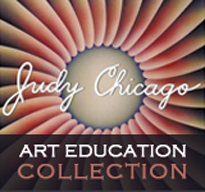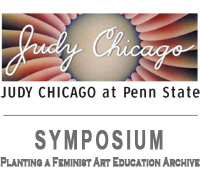Since 2011, Penn State has housed the Judy Chicago Art Education Collection, one of the most important private collections of archival materials on feminist art education. In honor of Chicago’s 75th birthday in 2014, and in celebration of the Penn State School of Visual Arts’ relationship with this pioneering artist, educator and author, the University hosted a symposium, exhibitions, lectures and other events highlighting Chicago’s work, throughout the spring 2014 semester.
Judy Chicago, keynote speaker at the symposium “Judy Chicago: Planting a Feminist Art Education Archive,” at Penn State (April 5–6, 2014), calls for a re-conceptualization of studio art teaching in higher education. During the first day of the two-day symposium, feminist artists, educators, and activists involved in planting and cultivating a living archive in a university libraries system explored what it means for an archive to live. With the notion of a living archive, presenters conceptualized an emerging feminist archival sensibility of collaboration, interconnectivity, participatory accessibility, resistance to injustice, positionality, and dialogism. In the second day of the symposium, Andrew Perchuk, deputy director of the Getty Research Institute, presented “You Say You Want a Revolution: Feminist Art in Southern California;” art historian Jane Gerhard presented “Moving to the Mainstream: The Dinner Party’s Long Road to the Brooklyn Museum”; Donald Woodman, photographer and co-facilitator with Judy Chicago in several of her teaching projects, presented “What About Men”; and William Catling, professor and department chair of art and design at Azusa Pacific University, presented “Transforming University Studio Art Education.”
Bios, photos, and presentation abstracts are in the Symposium Brochure, which can be download here.
Born in 1939 in Chicago, Judy Chicago rose to fame in the 1970s and is best known for her monumental work The Dinner Party (1974–79), the breathtaking, triangular table that is a symbolic history of women in western civilization and is now in the permanent collection of the Brooklyn Museum. She created three major collaborative projects afterwards: the Birth Project, Holocaust Project and Resolutions: A Stitch in Time. She continues making thought-provoking art in new media today, including her work in glass since 2003.
The spring 2014 events, included a survey exhibition of five decades of Chicago’s artwork, on display at the Palmer Museum of Art, and the Judy Chicago Art Education Collection of her teaching projects, on display in the Special Collections Library, offered experiences that connect Judy Chicago’s content-based art to the approaches she developed in her teaching.
Chicago’s teaching projects, the focus of the Judy Chicago Art Education Collection, include archival material from the Fresno Feminist Art Program (1970), Womanhouse (1971–72), New York Feminist Art Institute (1980), SINsation (University of Indiana, Bloomington, 1999), From Theory to Practice (Duke, 2000), At Home (Western Kentucky University, 2001–02), Envisioning the Future (Cal Poly and the Pomona Art Colony, 2003–04) and Evoke/Invoke/Provoke (Vanderbilt, 2005).
The Judy Chicago Art Education Collection is housed in the University Archives in The Eberly Family Special Collections Library, 104 Paterno Library. It includes videos, photographs and notes on Chicago’s teaching projects. The collection includes online The Dinner Party Curriculum Project, developed by Marilyn Stewart, Peg Speirs and Carrie Nordlund, under the directorship of Marilyn Stewart, and in collaboration with Judy Chicago and Constance Bumgarner Gee, given by the Through the Flower organization (TTF) to Penn State’s College of Arts and Architecture for stewardship by the Art Education program.
The Judy Chicago events at Penn State were sponsored by the Friends of the Palmer Museum of Art, School of Visual Arts, Institute for the Arts and Humanities, Office of Research in the College of Arts and Architecture The Eberly Family Special Collections Library in the University Libraries, HUB-Robeson Galleries, John M. Anderson Endowed Lecture Series, Women’s Studies Program, Sexuality and Gender Studies Minor, Women’s Studies Graduate Organization, and the Department of Art History, as well as Through the Flower and the National Art Education Association Women’s Caucus.
For more information on the Judy Chicago Art Education Collection, visit http://judychicago.arted.psu.edu/.


Leave a Reply
You must be logged in to post a comment.